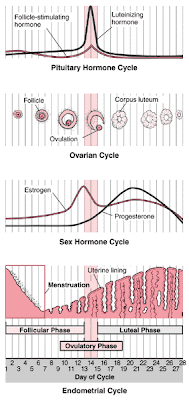Changes During the Menstrual Cycle
 |
| Photo credit: MerckManuals.com |
The menstrual cycle begins with menstrual bleeding (menstruation), which marks the first day of the follicular phase. Bleeding occurs when levels of estrogen and progesterone decrease, causing the thickened lining of the uterus (endometrium) to degenerate and be shed.
During the first half of this phase, the follicle-stimulating hormone level increases slightly, stimulating the development of several follicles. Each follicle contains an egg. Later, as the follicle-stimulating hormone level decreases, only one follicle continues to develop. This follicle produces estrogen.
The ovulatory phase begins with a surge in luteinizing hormone and follicle-stimulating hormone levels. Luteinizing hormone stimulates egg release (ovulation), which usually occurs 16 to 32 hours after the surge begins. The estrogen level peaks during the surge, and the progesterone level starts to increase.
During the luteal phase, levels of luteinizing hormone and follicle-stimulating hormone decrease. The ruptured follicle closes after releasing the egg and forms a corpus luteum, which produces progesterone. Later in this phase, the level of estrogen increases. Progesterone and estrogen cause the lining of the uterus to thicken more.
If the egg is not fertilized, the corpus luteum degenerates and no longer produces progesterone, the estrogen level decreases, the lining degenerates and is shed, and a new menstrual cycle begins.
Full article: MerckManuals.com
TODAY'S BOOK SUGGESTION:
 Perfect Hormone Balance for Fertility: The Ultimate Guide to Getting Pregnant
Perfect Hormone Balance for Fertility: The Ultimate Guide to Getting Pregnantby Robert A. Greene M.D. and Laurie Tarkan
-- You have more than one hundred hormones circulating in your body – reproductive hormones, pregnancy hormones, sex hormones, metabolic hormones, and stress hormones – relaying messages from tissue to tissue, organ to organ, brain to body, and body to brain.
An equilibrium, a perfect balance in both partners, often determines your ability to conceive and support a pregnancy.
When your body is imbalanced, conception becomes very difficult. Luckily, hormonal imbalances can be corrected.
Drawing on the latest research in this field – which links underlying hormonal issues with infertility in men and women – Dr. Robert Greene, fertility specialist, ob/gyn, and reproductive endocrinologist, has created the Perfect Balance Fertility Program to help patients attain the optimal hormonal health that is necessary for conception.
Click to order/for more info: Perfect Hormone Balance for Fertility
Don't have a Kindle? Get your Kindle here, or download a FREE Kindle Reading App.
Category: estrogen, FSH, Hormones, LH, menstrual cycles, ovulation









0 comments